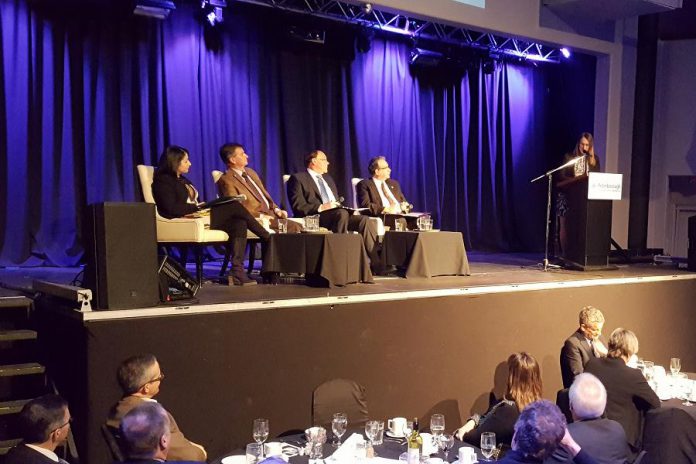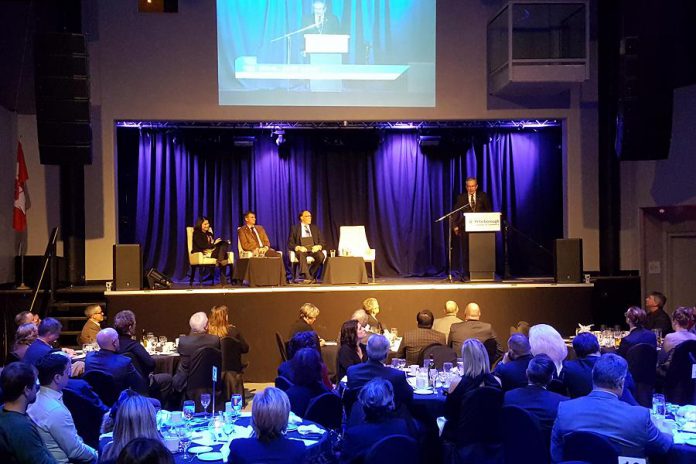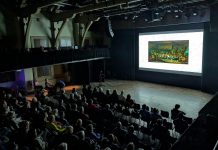
For the second year in a row, the Peterborough Chamber of Commerce brought Peterborough’s top politicians together on stage for the “Power Hour” last night (January 25) at The Venue in downtown Peterborough.
The event featured Maryam Monsef (MP Peterborough-Kawartha and Minister for Status of Women), Jeff Leal (MPP Peterborough and Minister of Agriculture, Food and Rural Affairs and Minister Responsible for Small Business), Joe Taylor (Warden, County of Peterborough), and Daryl Bennett (Mayor, City of Peterborough). New to the Power Hour this year was Taylor, who was elected County Warden in December to replace J. Murray Jones.
The audience at The Venue — which included business people, other elected officials, the media, and more — enjoyed a buffet dinner before settling in to hear from Peterborough’s elected officials.

Introduced by Chamber policy analyst Sandra Dueck, each politician took to the stage in turn (Monsef, Taylor, Bennett, then Leal) for a 10-minute presentation to share accomplishments over the past year and thoughts about the future, with a particular emphasis on issues of importance to the business community.
Then, in the most engaging part of the evening, the four politicians sat together on stage for 30 minutes to answer a series of questions collected earlier from Chamber members and others, with Dueck moderating. Here’s a summary of their responses.
Free trade with the U.S.
The first question, directed to MP Monsef, was about the impact of the new U.S. administration on free trade with Canada.
Monsef said that Canada shares the goals of the U.S. administration to improve the conditions of the middle class and is well-positioned on trade.
“Over 30 states have Canada as their number one customer,” Monsef said. “There’s about nine billion dollars at stake here for the (United States). So it’s more than a relationship based on some shared values, it’s a relationship based on economy.”
In his response, Leal emphasized it’s the personal relationships between leaders of the two nations that will have the greatest impact. He relayed a story about how the relationship in the 1960s between Prime Minister Lester Pearson and President Lyndon Johnson led to the 1967 World’s Fair being held at Expo 67 in Montreal rather than in Moscow as originally proposed, as well as the signing of the Auto Pact — the first free trade agreement — in 1965.
“I think Prime Minister Trudeau is going to be wise to call upon former Prime Minister Brian Mulroney,” Leal said. “Mr. Mulroney has phenomenal relationships within the American business community. Calling upon those individuals, like former Prime Minister Mulroney and others … Gary Doer, the former ambassador down there … is really a good way to forge these relationships. Many premiers have great relationships with border states, with their governors, and that will allow us to certainly make the Canadian case in a very effective way.”
Bennett commented on the Trump administration’s actions to reduce regulatory restrictions.
“We’re so highly regulated that competition beyond what we’re doing gets very very disheartening,” Bennett said. “We need to put something in place to give some relief on the business front, from the regulatory side of it … I strongly suggest we need to keep a very close eye on what the U.S. does in the next number of months.”

High hydro rates
The next question, directed to MPP Leal, was on the impact of high electricity rates and delivery charges affecting investment in Ontario and what options may be available to mitigate it.
In response, Leal first referred to his opening remarks where he spoke about the eight percent HST rebate for all Hydro One customers and the 12 percent reduction for rural customers, both effective January 1st. Then he provided a rationale for why hydro rates have increased.
“We virtually rebuilt transmission capacity in the Province of Ontario since 2003, that was a very expensive undertaking,” Leal said. “When I got the great privilege of being MPP for Peterborough, one of the things the business community talked to me about was reliability. One of the ways we were able to build in reliability is to rebuild the transmission. We’ve accomplished a significant amount of that.
So we’re now looking at positive ways we can bring in substantive relief, knowing full well that electricity rates in the Province of Ontario will always be somewhat higher than our neighbours in Quebec or Manitoba, where they have the geographic asset of a lot of run-of-the-river operations.”
Leal noted that Ontario has signed an agreement with Hydro Quebec to take advantage of that province’s run-of-the-river surplus, along with a seasonal exchange of power.
He also pointed out that the lack of blackouts or brownouts during last year’s hot summer is evidence of the reliability of the electricity infrastructure, which is especially important to the industrial sector.
In conclusion, Leal said that the Ontario government is looking at other options to mitigate hydro rates that will be announced prior to the next election.
In his response to the question, County Warden Joe Taylor said he didn’t support the “flawed” Green Energy Act when it was introduced by the Ontario government in 2009.
“I think that it has put rural Ontario in particular and all of Ontario in general, at a disadvantage in many ways,” Taylor said. “You (Leal) talked about how we have a competitive tax rate and that may be, but I’m afraid that the exorbitant hydro rates offset that advantage. I look forward to seeing what remedial works the Province has in mind to correct what I see as a mistake. The future will tell.”
Mayor Daryl Bennett pointed out that the cost of refurbishing the Darlington nuclear plants is going to drive up the kilowatt cost of nuclear power by two cents. He also said the Americans are shutting down nuclear facilities in favour of cheaper gas-fired plants, and that they don’t have a cap-and-trade process which will also make Ontario power more expensive.
“Yes, the environment is near and dear to all of us and, yes, the economy and the environment has to balanced out in tandem,” Bennett said. “But there has to be some real careful consideration on how we best move forward.”
Minister Monsef surveyed the crowd to find out how many people believe climate change is real (most hands went up).
“There’s been decades of lost opportunity, there’s been decades of inaction,” Monsef said. “If we don’t do something the legacy that we leave behind for our children and for our grandchildren will not be the clean and healthy environment we enjoy.”
She said that the economy and the environment must be balanced, based on science and best practices. On cap and trade, she said those dollars will go back to the provinces for reinvestment.
Completion of Highway 407
The next question, directed to Warden Taylor, was on the County’s plan for business and residential development to prepare for the extension of Highway 407 to Highway 115.
Taylor said the County of Peterborough Planning Department is doing a growth analysis study to determine where that is likely to happen and whether there is sufficient land in the townships, and roll that into the County’s official plan.
“We are well positioned to take advantage of the growth (from the 407 extension),” Taylor said. “We’ll try to make sure we have lands available, the servicing that will be required and, once the road is open, that people are welcome to come up and locate in Peterborough County.”
Mayor Bennett pointed out that the Ontario’s Places to Grow legislation is not realistic given the expectations for growth in the Peterborough area, and the costs of infrastructure to support growth are beyond current capability.
“The price of housing in this area right now is at a premium because of the supply and demand factor,” Bennett said. “We have to build infrastructure to support our ability to get back on track.”
MPP Leal provided an update on the 407 extension project. He said the extension of the 407 from Harmony Road in Oshawa to the junction of 418 at Taunton Road should be open by November 2017.
“The bad news is, (for) the first section has been toll free for a while, the tolls come into place on February 1st,” Leal said. “But on the section that is owned by the Government of Ontario — that’s from Brock Road in Pickering to Harmony Road in Ontario — the tolls in that section will be 30 percent less at peak times. There will be one tolling bill from 407 ETR but 407 ETR will remit back to the Province of Ontario the portion of the tolls that are on our section.”
Growth in Downtown Peterborough
The fourth question, directed to Mayor Bennett, was about balanced growth in Peterborough including growth in the downtown.
Bennett said the plan for the “reinvigoration” of the old Public Works Yard in downtown Peterborough has generated a considerable amount of positive interest in the community.
“It’s something that we have been lacking for a long time,” Bennett said. “A location for something that can support the downtown, that has the ability to draw groups of people on a regular basis. (We’re) looking at a new OHL facility, looking at a convention centre, looking at a hotel to support that, looking at some condominiums … which are going to be right beside the new VIA line that we’re hopeful that the upper level of government and the Province will be putting their weight behind to ensure that that becomes a reality in the future. That’s going to put a completely different complexion on the downtown core of our community.”
Bennett explained that Ontario’s Places to Grow legislation requires the City to look at a “reinvigoration and intensification” of inner regions including reuse of properties. He said there are a considerable number of people interested in partnerships for the old Public Works Yard as well as existing property owners in the downtown core wishing to rebuild some of the smaller and older sites.
“It’s time that Peterborough got itself focused on the growth of the downtown,” Bennett said. “We need people to grow the business atmosphere and to protect the interests of the downtown.”
Minister Monsef pointed out that the federal government will be investing over $90 billion over the next decade in infrastructure, including social infrastructure like housing, transportation, and green infrastructure.
“There are 338 ridings across this country who have many of the same challenges that we have here, who are experiencing the same infrastructure deficits that we have here, some even more, and every single one of those communities wants its fair share of those dollars,” Monsef said. “Now what would give a community like ours a competitive advantage? It’s official plans like you (Taylor) talked about.”
Monsef encouraged municipalities to coordinate planning to help determine priorities for immediate, medium term and long term projects.
“An official plan will allow all of us as a community, regardless of whether we’re downtown or in the new developments in the community, to come together and keep talking about it together.”
MP Leal said the current City Council and preceding councils deserve a lot of credit for the preservation of Peterborough’s downtown. He pointed out that a lot of communities in Ontario have abandoned their downtowns.
“When you abandon your downtown area, the incidence of crime increases dramatically,” Leal said. “The best way to keep a downtown healthy is a combination of commercial development with residential development.”
VIA Rail proposal
The final question, directed to Minister Monsef, was on championing the proposal to extend VIA Rail into Peterborough.
“My honourable colleague Marc Garneau (Minister of Transport) hears about my support for this initiative,” Monsef said. “Not just to upgrade the rail beds so that businesses like the mines we have in Havelock stay here.”
Monsef gave a shout out to Unimin Canada, which mines nepheline syenite in Havelock — used in glass, ceramics, and paint.
She also thanked Shining Waters Railway for its dedication to the initiative. She said many supportive letters have come to her office, which she has shared with Minister Garneau.
“It’s an important legacy project to connect Canada and Canadians,” Monsef said. “To that end we invested in the last budget 3.3 million dollars to study seriously the merits of the high-frequency rail project that VIA Rail has proposed. I’ll continue to be a strong advocate for it.”
In closing, Minister Monsef also pointed out that January 25th is Bell Let’s Talk Day and recognized the work of mental health advocates like Kerri Davies of the local Canadian Mental Health Association.
“Unless we recognize the real challenge that mental illness and the stigma associated with mental illness presents to our communities, to our businesses, to our workplaces, I don’t think we’re going to reach our full potential … This is an issue we need to address, especially for the young people in our communities.”
“Power Hour” was recorded in its entirety by sponsor Cogeco Connexion. It will be broadcast on TVCogeco (channel 10) at 7 p.m. on Thursday, January 26th and then again at 12 p.m. and 3:30 p.m. on Friday, January 27th, and at 4 p.m. and 7 p.m. on Monday, January 30th.


























